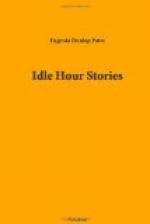Then resisting the temptation to give the history of the rest of her favorites, she put the box aside and turned her attention to the quart bottle in hand, with its strip of muslin stretched tight around it, over a bewildering collection of grapes and leaves. This was her method, and the admiring sisters thought it perfect.
That night I teased John’s mother into hunting up the dress, and there was the identical pattern, edging the fine white cambric now yellow with age. She was amused at my report of Miss Chrissy.
In my annual journeyings to the old town I never neglected “The Pears.” They always looked as if I had just stepped out for an hour, and come back. The carpet did not wear out; the stove never lacked luster; the tiny window-panes were always just washed, and the diligent fingers went on just the same. They had a quaint way not easy to describe. When one talked all the rest chimed in with little whispering echoes, to support the assertion; and yet they did not seem to interrupt. They were to me living wonders, so perfectly unspotted from the world, so earnest in their pigmy money-making, and so thoroughly united, I felt consumed with curiosity as to their inner life. They must sometimes put by the quilting and the knitting and the patterns.
“How do you interest yourselves evenings, Miss Chrissy?” I asked, half ashamed of the question.
“Oh, we read,” she said, smiling her ready smile. “Yes, read,” echoed Miss Suffy and the rest. “We read Sunday-School books, and our Bible, of course. Sometimes we don’t go to bed till ten o’clock.”
“Ten o’clock—o’clock—o’clock,” assented the gentle voices. It was not silly; the smiling faces all wore the sweet, simple look of guileless childhood.
Miss Suffy’s window overlooked a time honored graveyard, where gray slabs were tottering. Next to her beloved patterns and their varied experiences, Miss Chrissy liked to tell of scenes and memories suggested by these somber reminders.
“It was a very cold day, Mrs. John,” (so she always called me), “when they buried your husband’s uncle out there. Poor fellow! He was shot at Buena Vista. A cannon-ball took off both his legs, and went right through the horse he rode. He was a gallant officer. They thought at first he would rally. The surgeons did their work quickly, and he suffered little or no pain, but there was no chloroform in that day, and he died from the shock. The snow was deep on the ground, but it was a grand funeral. They’ve got a fine new cemetery out on the hill, but we never go there. Our dead are all here where we can see their graves.”
“Graves,” came the echo, they had all along nodded, or murmured, assent.
“One of the saddest funerals we have ever seen.” Miss Chrissy went on, “was a double funeral. Two young men, both only sons, were drowned in the river while bathing. Their mothers were widows. It was terrible. Two hearses and two long lines of mourners. There they lie—over there in that enclosure. They were cousins, and were buried side by side.”




